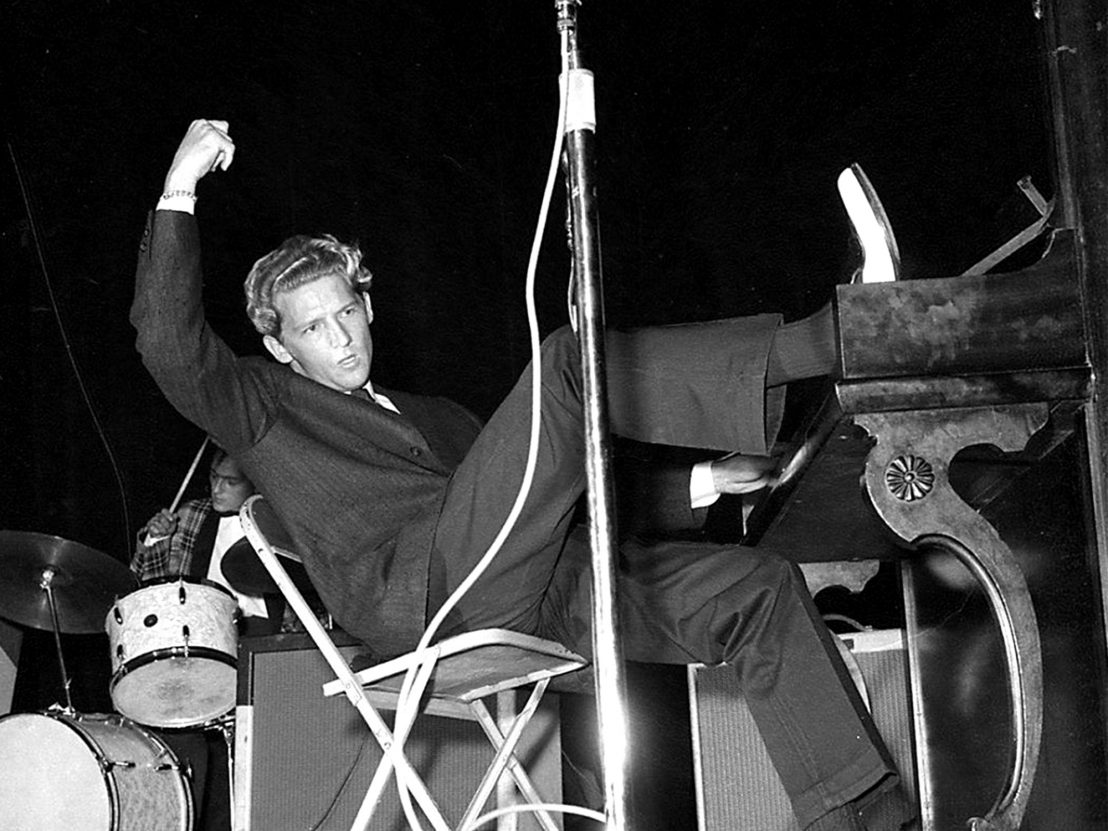
Ethan Coen’s solo debut effort is a ribald and energising archive montage on the life of taboo-busting rocker, Jerry Lee Lewis.
Jerry Lee Lewis, the first-generation rock and roll star, is “not dead,” as both Thierry Frémaux and Ethan Coen marvelled at the introduction of the latter’s documentary Jerry Lee Lewis: Trouble in Mind.
Indeed, there’s a surprising amount of Jerry Lee at this year’s Cannes: at the very least, he’s part of the implicit context of Baz Luhrmann’s Elvis, about his Sun Records labelmate and rival, and then Top Gun: Maverick has that callback to the original, when Goose’s sun Rooster pounds out ‘Great Balls of Fire’ just like his dad, and an entire barroom of millennial aviators, improbably know all the words. Or maybe not so improbably – as the documentary reminds you, it’s an all-time ironclad banger.
Ethan Coen’s archival doc, his first film without brother Joel, picks the perfect opening clip: Ed Sullivan, introducing Lewis’s performance of his 1970 country hit ‘She Even Woke Me Up to Say Goodbye.’ Even in colour, Ed Sullivan invokes the Beatles and the rock ’n’ roll youthquake, and the performance nicely summarises the crosscurrents that fed Lewis’ art and set the stage for the revolution: the repentant eye contact and deep bass voice of gospel, the twangy hillbilly lament and hard-luck poetry of the lyrics; and then, still, the Killer’s famous manic performance style, which even in this more staid mode hearkens back to Black boogie-woogie music – that percussive piano playing, with his hands sweeping hungrily along the keys or drawn up at the wrists, like a marionette on strings, before slamming back down.
Jerry Lee Lewis is a real American type: born to a farming family in Ferriday, Louisiana in 1935, drawn from an early age to the barrelhouse blues club on the Black side of town, he taught himself to play piano at the age of eight, even as he was raised in the Pentecostal church and assimilated its fire-and-brimstone teachings. The notorious televangelist Jimmy Lee Swaggart was one of his many, many cousins – more on one of whom which shortly – and Jerry Lee in this film is seen to speak frequently about his belief in salvation, and the guilt that accompanies his legendary appetites.
He believes in Heaven and Hell and isn’t sure where he’ll end up; in an interview with Tom Snyder, he says he doesn’t think Jesus would have sung his epochal horned-up rhythm and blues crossover ‘Whole Lotta Shakin’ Going On’ – but then, we aren’t none of us Jesus.
From age 20 he rose rapidly to fame through Memphis’s Sun Records alongside Elvis and others, with hits like ‘Breathless’ and ‘High School Confidential’ – in one of several of Coen’s droll edits, a clip from this song segues straight into the abrupt end of Lewis’s pop career, brought about by the revelation of his marriage to the 13-year-old Myra, identified in one clip as Lewis’s “ex-wife and cousin.” (A teenaged Winona Ryder played Myra in Jim McBride’s hilarious 1989 biopic Great Balls of Fire! opposite a too-old but appropriately toothy and cocky Dennis Quaid.)
His career involves one of the first modern cancellations – and, paving a path followed by many others since, this was followed by an eventual, semi-repentant comeback for a more niche audience, as a country hitmaker with a taste for gospel and whisky (no repentance without sin and all that) and eventually an American institution and legendary live act.
Coen’s documentary is all archival clips except for a brief snippet of a pre-pandemic 2020 gospel recording session with the octogenarian Lewis; it gives the broad outlines of both his biography and the history of his music, both already widely known. Mostly, it makes the case for the cross-racial roots of rock and roll in the Jim Crow South, and for its erotic and dangerous excitement.
Clips include many vintage talk-show appearances and documentary interviews over the years, with vintage hairstyles and cultural assumptions, and a gratifying volume of full performances which showcase his devilish energy: kicking out the piano stool and playing standing up, legs spasming and blonde forelock flopping everywhere, talking sweet raunch over hard piano vamps and then jumping up on top of his instrument like a tent revivalist. The Killer is one of the ultimate Saturday Night and Sunday Morning acts; few have better embodied the wildness and grace of American music.
Little White Lies is committed to championing great movies and the talented people who make them.
Published 23 May 2022

By Ed Gibbs
This multi-sensory look at David Bowie’s life and career is an all-consuming affair that explores and safeguards the man’s legacy.

Denzel Washington and Frances McDormand take on the most infamous power couple in literary history, care of Joel Coen.

By Jordan Cronk
With Hail, Caesar! hitting cinemas this week take a listen back through some of the directors’ greatest hits.